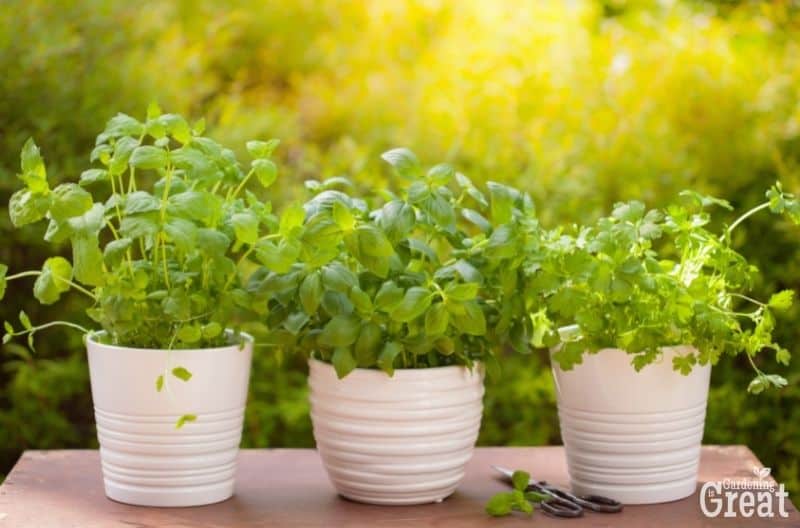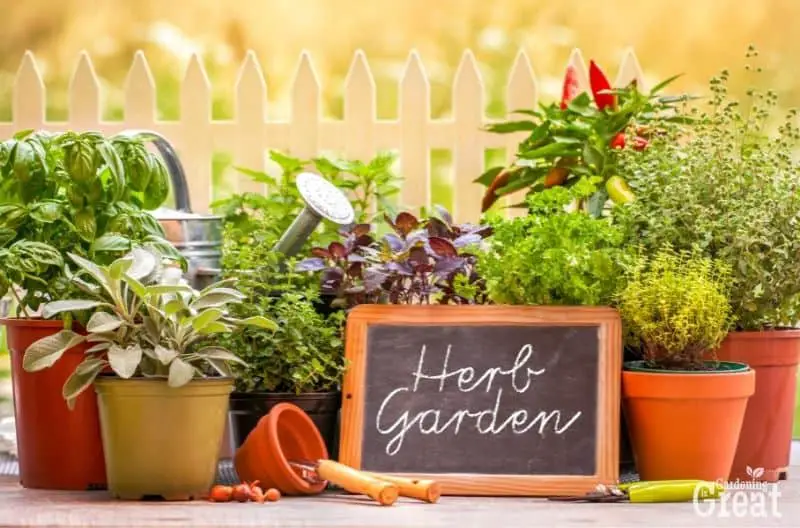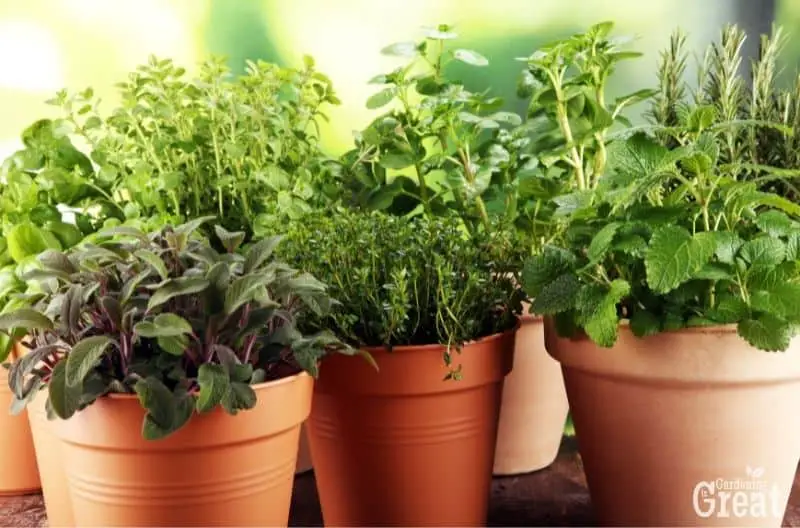A Guide to Growing Herbs for Beginners
Growing herbs can be a great choice of plants for beginners due to their easy management and lack of time commitment needed.
If you are new to gardening, take a look at this guide to growing herbs for beginners to help you start a successful herb garden at home.

What are Herbs?
Herbs are leafy plants that are often used when cooking to add flavor or seasoning to food. These plants are often very aromatic and can be cooked fresh or once dried.
Herbs have numerous health benefits from anti-inflammatory properties to being high in antioxidants.
Due to their flavors and health properties, they are an incredibly popular choice for beginner gardeners to grow at home.

What do Herbs Need to Grow?
In order to grow herbs successfully, they need two things:
- Sunlight
Herbs are plants that like a lot of sunlight, so when planning where to place your herb garden, ensure your herbs will have a lot of sun throughout the day.
As a beginner gardener, perhaps you do not have a large garden or space for your herbs in the ground. You could use pots instead and move the pots to the area in your garden which gains the most amount of sunlight.
- Soil with good drainage
This is an incredibly important factor when growing herbs. Herbs need to be in soil that is not too wet and soggy. If the soil is compact, excess water will not be able to drain away as efficiently and will impact the growth and health of your herbs.
Equally, if you are using pots to grow your herbs in, ensure your pots have holes in and the soil is loose so the excess water can drain away.
Choosing Your Herbs to Grow
Now you know that herbs need two basic components to grow well, you need to select the type of herbs you would like to grow in your herb garden.
Would you like herbs that grow every year without having to replant them? Or would you like to plant herbs from seeds yearly?
The answer is likely based on:
- How much time you have to grow herbs
- What herbs you want to grow
- How long you want your herb garden for
For example, if you only want herbs for this summer as you are moving away next year, then you would probably focus on growing annual herbs such as coriander and basil. Annual herbs are plants that need re-seeding every year.
If you want your herb garden to regrow every year, then you are best to focus on perennial plants. These herbs such as chive and mint, regrow every year so you don’t have to plant them again from seeds.
For most people, however, it is probably a case of there are specific herbs you want to grow e.g. thyme, basil, and cress, which would be a combination of annual and perennial plants. To help you choose, here is a list of 10 perennial and 8 annual herbs:
Perennial Herbs – herbs that regrow every year:
Annual Herbs – herbs that require you to reseed:
How to Grow Herbs for Beginners?
Plant seeds in beginner pots or growing tray
In order to protect your herbs from the elements and give them a good start, it is best to plant them in small pots, to begin with.
If you are using a growing tray, only plant 1-2 seeds of one herb per pot. Ensure to plant them just below the surface of the soil, so that they are covered with soil but not buried at the bottom of the pot. This would lead to them potentially being flushed away when watered.
Remember from earlier in this post, ensure your pots or growing tray has holes underneath to allow the excess water to drain away and so your seeds do not become too wet.
Potting soil
When growing herbs, it’s a good idea to provide them with compost in the growing trays. Compost is full of nutrients and will help your herbs to grow healthy from the very beginning.
Water and provide sunlight
Now you have added seeds to your pots, it is time to water them. Your growing pots are very small, so be careful not to overwater them. The soil should be moist to touch but not have surface water.
Place your planted herbs in sunlight and a warm location.
It is best, if you can, to leave your herbs inside until they have germinated. This can take 2-4 weeks from sowing your seeds.
Water your herbs so that the soil stays moist and ensure they continue to gain access to sunlight during this time.
Transferring herbs
Once your herbs have started to grow, it’s now time to transfer them from your growing trays or small pots into larger pots. It is recommended to fill your new pot with some soil and compost first and water this so it is moist.
Then, carefully take your small herbs out of their growing tray. Plant one herb with some of the original compost into each pot.
Gently, push the soil down around your herb so that it remains upright rather than falling to the side. Try not to push too hard as you will compact the soil and have a negative impact on the drainage.
Moving Herbs Outside
After a few more weeks, your herbs are larger and stronger. They are now ready to begin adjusting to living outside.
Plants need a gradual adjustment to the outside so they do not experience shock. There are changes in terms of temperature, weather, atmosphere, light, and shade that they have to adjust to.
Initially, place your potted herbs outside in the sun for 1-2 hours each day. Gradually increase the amount of time that they spend outside. Continue to do this until they are then outside all day and night.
At this point, you can decide if you want to keep your herbs in pots, or, plant them in the ground. Remember, some herbs need 2-4 feet around them to grow, so would benefit from being in the ground where they can spread out.
If you choose to plant your potted herbs in the ground, ensure to dig up and turn your soil first. Good drainage is key to successfully growing herbs. When turning the soil, add in compost so your herbs gain a healthy amount of nutrition that may not otherwise be in the soil.
Again, water this soil first so that it is moist before transferring your potted herbs.

Growing Herbs for Beginners Recap
Like all plants, growing herbs need time and patience. With a little bit of care, beginner gardeners can have a healthy and thriving herb garden in just a couple of months.
Here is a recap of the top tips covered to help beginners grow herbs:
- Herbs need sunlight and good drainage within the soil to grow healthily
- Choose whether you want to grow herbs that are perennial or annual
- Use compost and a growing tray or small pots to grow your herbs inside first
- Transfer your herbs into bigger pots after 2-4 weeks when they have germinated
- Gradually increase the amount of time your potted herbs spend outside to climatize to the change in atmosphere and temperature
- If transferring potted herbs to ground soil, turn your soil and add compost first for additional nutrients and good drainage.
- Enjoy cooking with your herbs in your very own herb garden!
And for more beginner gardening tips, check out these next:
